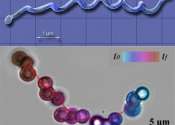A new micro-robot delivers drugs in capsules
An international team of researchers, led by Professor Hongsoo Choi, Director of DGIST-ETH Microrobot Research Center, has developed capsule-type microrobots that can encapsulate cells and drugs and deliver them to targeted ...








